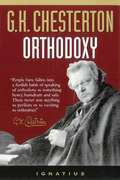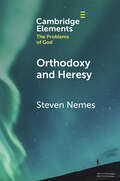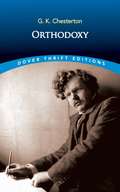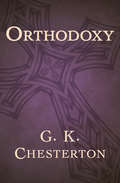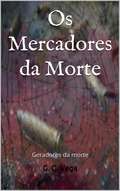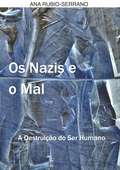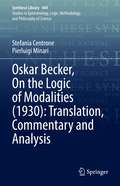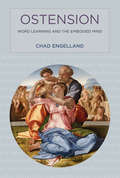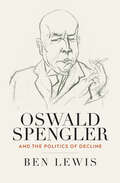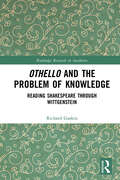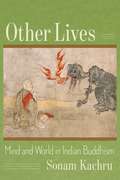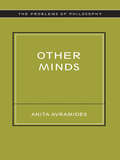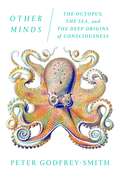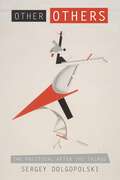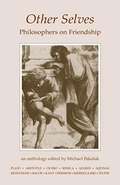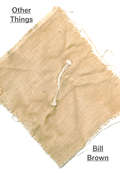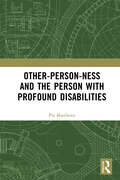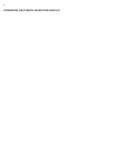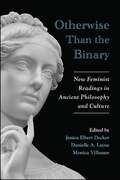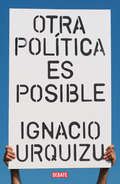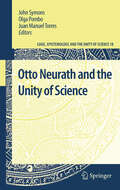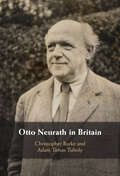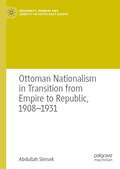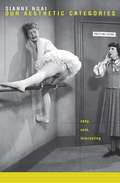- Table View
- List View
Orthodoxy
by G. K. ChestertonOrthodoxy (1908) is a book by G. K. Chesterton that has become a classic of Christian apologetics. Chesterton considered this book a companion to his other work, Heretics. Chesterton presents an original view of Christian religion. He sees it as the answer to natural human needs, the "answer to a riddle" in his own words, and not simply as an arbitrary truth received from somewhere outside the boundaries of human experience.
Orthodoxy and Heresy (Elements in the Problems of God)
by Steven Nemes'Orthodoxy' and 'heresy' are essential categories by which the 'Catholic' theological tradition evaluates the (im)propriety of various beliefs and practices relative to its non-negotiable commitments. This Element sketches moments in the development of Christian 'orthodoxy' and 'heresy' in time, as much in the Old and New Testament as in the history of the Church. It also touches upon the vexed theological-methodological question of the relation between Scripture and ecclesial Tradition before concluding with a critique of the 'Catholic' tradition's preoccupation with 'orthodoxy' and 'heresy' in favor of a Christian theology 'without anathemas' that is concerned only for truth.
Orthodoxy: Large Print (Dover Thrift Editions)
by G. K. ChestertonOrthodoxy, as G. K. Chesterton employs the term here, means "right opinion." In this, the masterpiece of his brilliant literary career, he applies the concept of correct reasoning to his acceptance of Christianity. Written in a down-to-earth and familiar style, he presents formal and scholarly arguments in the explanation and defense of the tenets underlying his faith. Paradox and contradiction, Chesterton maintains, do not constitute barriers to belief; imagination and intuition are as relevant to the processes of thought and understanding as logic and rationality. "Whenever we feel there is something odd in Christian theology," he observes, "we shall generally find that there is something odd in the truth." He defines his insights with thought-provoking analogies, personal anecdotes, and engaging humor, making this century-old book a work of enduring charm and persuasion.
Orthodoxy: Large Print (Mobi Classics Ser.)
by G. K. ChestertonG. K. Chesterton meditates on the value of the Christian faith to society in this celebrated essay Inspired by a friend to examine his personal philosophy on religion, G. K. Chesterton walks readers through his conversion to Christianity, which was based on a rational consideration of fact. Orthodoxy considers the logical and scholarly arguments in favor of the Christian faith and presents an impassioned argument for the church as a positive, liberal organization. One of the strongest apologias ever written, it is a critical triumph from a renowned author, poet, journalist, and philosopher, whose own spiritual journey provides the foundation for this fascinating treatise on religious belief. This ebook has been professionally proofread to ensure accuracy and readability on all devices.
Os Mercadores da Morte.
by Guido Galeano Vega Elizani B.Neste livro: Os Mercadores, não é minha intenção julgar determinados grupos de pessoas, envolvidas na comercialização de equipamento militar, e comercialização de violência no mundo, mas se você pretende ajudá-lo a entender que não é o caminho certo para o mundo, para as sociedades humanas e para toda a vida no planeta. Esses sistemas nos empurram de maneira acelerada para repetir os mesmos erros do passado, quando destruímos muito do que tanto sacrifício significou para construí-lo e, literalmente, mais de 60 milhões de pessoas foram eliminadas em um tempo muito curto. A guerra é a invenção mais irracional do planeta, da raça humana. Espero que este livro ajude o planeta a considerar um caminho diferente, que não esteja nós levando inevitavelmente a repetir os erros do passado, mas em uma proporção totalmente irracional e diabólica.
Os Nazis e o Mal. A Destruição do Ser Humano
by João Romão Ana Rubio-SerranoO nazismo abriu a porta ao terrorismo globalizado. Traçou um mal estrutural onde ninguém estava a salvo, nem mesmo o povo alemão. O inimigo: todo aquele que fosse capaz de pensar por si mesmo de uma forma livre e contrária ao que ditavam as regras nazis. Os arianos eram pura e simplesmente «indivíduos fabricados», concebidos para a violência, isto é, autómatos inteligentes desumanizados. A socialização do crime mediante a violência convertida em cultura foi um dos objetivos que lograram estabelecer nos campos de concentração e na sociedade. A presente obra levanta novamente a eterna questão: «O que é realmente o Homem? Um ser humano ou uma massa amorfa?»
Oskar Becker, On the Logic of Modalities (Synthese Library #444)
by Stefania Centrone Pierluigi MinariThis book offers the first-ever English translation of Oskar Becker’s Zur Logik der Modalitäten. This essay, published in 1930, is a pioneering yet often neglected contribution in the context of prewar modal logic research in Europe. Becker’s text is complemented by an extended commentary that explains, analyzes and highlights Becker’s accomplishments and the philosophical background of his investigations.The commentary provides an in-depth analysis of all of Becker's important contributions, both from a philosophical and logical perspective, making it a very useful book for scholars in both philosophy and logic.
Ostension: Word Learning and the Embodied Mind (The\mit Press Ser.)
by Chad EngellandAn examination of the role of ostension—the bodily manifestation of intention—-in word learning, and an investigation of the philosophical puzzles it poses.Ostension is bodily movement that manifests our engagement with things, whether we wish it to or not. Gestures, glances, facial expressions: all betray our interest in something. Ostension enables our first word learning, providing infants with a prelinguistic way to grasp the meaning of words. Ostension is philosophically puzzling; it cuts across domains seemingly unbridgeable—public–private, inner–outer, mind–body. In this book, Chad Engelland offers a philosophical investigation of ostension and its role in word learning by infants.Engelland discusses ostension (distinguishing it from ostensive definition) in contemporary philosophy, examining accounts by Quine, Davidson, and Gadamer, and he explores relevant empirical findings in psychology, evolutionary anthropology, and neuroscience. He offers original studies of four representative historical thinkers whose work enriches the understanding of ostension: Wittgenstein, Merleau-Ponty, Augustine, and Aristotle. And, building on these philosophical and empirical foundations, Engelland offers a meticulous analysis of the philosophical issues raised by ostension. He examines the phenomenological problem of whether embodied intentions are manifest or inferred; the problem of what concept of mind allows ostensive cues to be intersubjectively available; the epistemological problem of how ostensive cues, notoriously ambiguous, can be correctly understood; and the metaphysical problem of the ultimate status of the key terms in his argument: animate movement, language, and mind. Finally, he argues for the centrality of manifestation in philosophy. Taking ostension seriously, he proposes, has far-reaching implications for thinking about language and the practice of philosophy.
Oswald Spengler and the Politics of Decline
by Ben LewisOswald Spengler was one of the most important thinkers of the Weimar Republic, but very little has been published on his politics, philosophy and life, especially in the English-language.Oswald Spengler and the Politics of Decline transforms the pre-existing picture of Spengler by demonstrating how Spengler’s radical opposition to liberal democracy was an unwavering facet of his thought from 1918 onwards. It adopts a completely novel approach by placing a new emphasis on his political activities and writings, and is unique in explaining the interplay between Spengler’s meta-historical considerations on world history and the practical demands of Realpolitik throughout the complex discourse of German national renewal.
Oswald Spengler and the Politics of Decline
by Ben LewisOswald Spengler was one of the most important thinkers of the Weimar Republic, but very little has been published on his politics, philosophy and life, especially in the English-language.Oswald Spengler and the Politics of Decline transforms the pre-existing picture of Spengler by demonstrating how Spengler’s radical opposition to liberal democracy was an unwavering facet of his thought from 1918 onwards. It adopts a completely novel approach by placing a new emphasis on his political activities and writings, and is unique in explaining the interplay between Spengler’s meta-historical considerations on world history and the practical demands of Realpolitik throughout the complex discourse of German national renewal.
Othello and the Problem of Knowledge: Reading Shakespeare through Wittgenstein (Routledge Research in Aesthetics)
by Richard GaskinThis book analyses the epistemological problems that Shakespeare explores in Othello. In particular, it uses the methods of analytic philosophy, especially the work of the later Wittgenstein, to characterize these problems and the play. Shakespeare’s Othello is often thought to connect with traditional sceptical problems, and in particular with the problem of other minds. In this book, Richard Gaskin argues that the play does indeed connect in interesting—but also in surprising and so far relatively unexplored—ways with traditional epistemological concerns. Shakespeare presupposes a generally Wittgensteinian model of mind as revealed in behaviour, and communication as necessarily successful in general. Gaskin examines different epistemological models of the tragedy, and argues that it is useful to apply materials from Wittgenstein’s On Certainty to the analysis of Othello’s loss of confidence in Desdemona’s fidelity: Othello treats Desdemona’s fidelity as a ‘hinge certainty’, something that is so fundamental to the language-game that abandoning it results—so Wittgenstein predicts—in chaos and madness. The tragedy arises, Gaskin suggests, from treating the wrong kind of thing as a hinge certainty. Othello and the Problem of Knowledge will appeal to scholars and advanced students interested in aesthetics, epistemology, philosophy of literature, Shakespeare, and Wittgenstein.
Other Lives: Mind and World in Indian Buddhism
by Sonam KachruHuman experience is not confined to waking life. Do experiences in dreams matter? Humans are not the only living beings who have experiences. Does nonhuman experience matter? The Buddhist philosopher Vasubandhu, writing during the late fourth and early fifth centuries C.E., argues in his work The Twenty Verses that these alternative contexts ought to inform our understanding of mind and world. Vasubandhu invites readers to explore experiences in dreams and to inhabit the experiences of nonhuman beings—animals, hungry ghosts, and beings in hell.Other Lives offers a deep engagement with Vasubandhu’s account of mind in a global philosophical perspective. Sonam Kachru takes up Vasubandhu’s challenge to think with perspective-diversifying contexts, showing how his novel theory draws together action and perception, minds and worlds. Kachru pieces together the conceptual system in which Vasubandhu thought to show the deep originality of the argument. He reconstructs Vasubandhu’s ecological concept of mind, in which mindedness is meaningful only in a nexus with life and world, to explore its ongoing philosophical significance. Engaging with a vast range of classical, modern, and contemporary Asian and Western thought, Other Lives is both a groundbreaking work in Buddhist studies and a model of truly global philosophy. The book also includes an accessible new translation of The Twenty Verses, providing a fresh introduction to one of the most influential works of Buddhist thought.
Other Minds (Problems of Philosophy)
by Anita AvramidesHow do we know whether there are other minds besides our own? The problem of other minds raises many questions which are at the root of all philosophical investigations - how it is we know, what is the mind and can we be certain about any of our beliefs?In this compelling analysis of 'other minds' Anita Avramides traces the question from the Ancient Sceptics through to Descartes, Malebranche, Locke, Berkeley, Reid and Wittgenstein. The second part of the book explores the views of influential contemporary philosophers such as Strawson, Davidson, Nagel and Searle.Other Minds provides a clear insightful introduction to one of the most important problems in philosophy. It will prove invaluable to all students of philosophy.
Other Minds: The Octopus, the Sea, and the Deep Origins of Consciousness
by Peter Godfrey-SmithAlthough mammals and birds are widely regarded as the smartest creatures on earth, it has lately become clear that a very distant branch of the tree of life has also sprouted higher intelligence: the cephalopods, consisting of the squid, the cuttlefish, and above all the octopus. In captivity, octopuses have been known to identify individual human keepers, raid neighboring tanks for food, turn off lightbulbs by spouting jets of water, plug drains, and make daring escapes. How is it that a creature with such gifts evolved through an evolutionary lineage so radically distant from our own? What does it mean that evolution built minds not once but at least twice? The octopus is the closest we will come to meeting an intelligent alien. What can we learn from the encounter? <P><P>In Other Minds, Peter Godfrey-Smith, a distinguished philosopher of science and a skilled scuba diver, tells a bold new story of how subjective experience crept into being―how nature became aware of itself. As Godfrey-Smith stresses, it is a story that largely occurs in the ocean, where animals first appeared. Tracking the mind’s fitful development, Godfrey-Smith shows how unruly clumps of seaborne cells began living together and became capable of sensing, acting, and signaling. As these primitive organisms became more entangled with others, they grew more complicated. The first nervous systems evolved, probably in ancient relatives of jellyfish; later on, the cephalopods, which began as inconspicuous mollusks, abandoned their shells and rose above the ocean floor, searching for prey and acquiring the greater intelligence needed to do so. Taking an independent route, mammals and birds later began their own evolutionary journeys. <P><P>But what kind of intelligence do cephalopods possess? Drawing on the latest scientific research and his own scuba-diving adventures, Godfrey-Smith probes the many mysteries that surround the lineage. How did the octopus, a solitary creature with little social life, become so smart? What is it like to have eight tentacles that are so packed with neurons that they virtually “think for themselves”? What happens when some octopuses abandon their hermit-like ways and congregate, as they do in a unique location off the coast of Australia? <P><P>By tracing the question of inner life back to its roots and comparing human beings with our most remarkable animal relatives, Godfrey-Smith casts crucial new light on the octopus mind―and on our own.
Other Others: The Political after the Talmud
by Sergey DolgopolskiDenying recognition or even existence to certain others, while still tolerating diversity, stabilizes a political order; or does it? Revisiting this classical question of political theory, the book turns to the Talmud. That late ancient body of text and thought displays a new concept of the political, and thus a new take on the question of excluded others. Philosophy- and theology-driven approaches to the concept of the political have tacitly elided a concept of the political which the Talmud displays; yet, that elision becomes noticeable only by a methodical rereading of the pages of the Talmud through and despite the lens of contemporary competing theological and philosophical theories of the political. The book commits such rereading of the Talmud, which at the same time is a reconsideration of contemporary political theory. In that way, The Political intervenes both to the study of the Talmud and Jewish Thought in its aftermath, and to political theory in general.The question of the political for the excluded others, or for those who programmatically do not claim any “original” belonging to a particular territory comes at the forefront of analysis in the book. Other Others approaches this question by moving from a modern political figure of “Jew” as such an “other other” to the late ancient texts of the Talmud. The pages of the Talmud emerge in the book as a (dis)appearing display of the interpersonal rather than intersubjective political. The argument in the book arrives, at the end, to a demand to think earth anew, now beyond the notions of territory, land, nationalism or internationalism, or even beyond the notion of universe, that have defined the thinking of earth so far.
Other Selves: Philosophers on Friendship
by Michael Pakaluk"Friendship, that pervasive, everyday, and subtle matter of our most intimate personal life, has rarely been accorded its due. Michael Pakaluk has retrieved the thoughts of our greatest thinkers on the subject and collected them into a handsome and handy volume. . . . A splendid book!" --M. M. Wartofsky, Distinguished Professor of Philosophy, Baruch College, City University of New York
Other Things
by Bill BrownFrom the pencil to the puppet to the drone--the humanities and the social sciences continue to ride a wave of interest in material culture and the world of things. How should we understand the force and figure of that wave as it shapes different disciplines? Other Things explores this question by considering a wide assortment of objects--from beach glass to cell phones, sneakers to skyscrapers--that have fascinated a range of writers and artists, including Virginia Woolf, Man Ray, Spike Lee, and Don DeLillo. The book ranges across the literary, visual, and plastic arts to depict the curious lives of things. Beginning with Achilles's Shield, then tracking the object/thing distinction as it appears in the work of Martin Heidegger and Jacques Lacan, Bill Brown ultimately focuses on the thingness disclosed by specific literary and artistic works. Combining history and literature, criticism and theory, Other Things provides a new way of understanding the inanimate object world and the place of the human within it, encouraging us to think anew about what we mean by materiality itself.
Other-person-ness and the Person with Profound Disabilities
by Pia MatthewsMany people think that profound disability presents us with a real problem, often because it seems difficult to connect with someone who does not seem to think or act like us. Positioning profound disability in this way immediately sets up a ‘them’ and ‘us’, where the person with profound disability becomes the problematic ‘other’. Attempts to bridge the ‘them’ and ‘us’ risk reducing everyone to the same where disability is not taken seriously.In contrast to a ‘them’ and ‘us’, and negative connotations of the other found in the existentialist philosophies of writers like Sartre and Beauvoir, Pia Matthews argues for a return to a positive view of the other. One positive approach to the other, based on an ethics of relationship as championed by Levinas, seems to mitigate the other-ness of profound disability. However, this still makes the person with profound disability dependent on the ethical concern of the more powerful other. Instead, this book argues for return to a personalist philosophy of being offered by Mounier, Marcel, and Wojtyła, and deepened by participation, belonging, and the possibility of contributing to the good of all. This deepened philosophy of being gives a more solid foundation for people who are especially at the mercy of others. It will be of interest to all scholars and students of disability studies, philosophy and anthropology.
Otherwise Than Being or Beyond Essence
by Richard A. Cohen Alphonso Lingis Emmanuel LevinasOtherwise than Being, or Beyond Essence, first published in 1974, is the second of Levinas's mature philosophical works, the first being Totality and Infinity (first published in 1961). Otherwise than Being is essentially the sequel to Totality and Infinity, further elaborating the rich and comprehensive philosophy of ethical metaphysics that Levinas had introduced in the earlier work. <P><P>At the heart of Levinas's writings is the irreducible ethical proximity of one human being to another morality, and through that encounter a relation to all others justice. Otherwise than Being emphasizes the themes of moral sensibility and language within this system of ethical metaphysics. These themes had been introduced in Totality and Infinity, but are developed in this later work. And while Totality is focused on ethical alterity, Otherwise is focused on ethical subjectivity. The process of the revelation of Being as laid out by modern phenomenological ontology is severely criticized, as Levinas claims that the ultimate account of these phenomena is not in ontology, but in a paradoxical discourse of what is beyond Being.
Otherwise Than the Binary: New Feminist Readings in Ancient Philosophy and Culture (SUNY series in Ancient Greek Philosophy)
by Jessica Elbert Decker; Danielle A. Layne; Monica VilhauerOtherwise Than the Binary approaches canonical texts and concepts in Ancient Greek philosophy and culture that have traditionally been understood as examples of binary thinking, particularly concerning sexual difference. In contrast to such patriarchal logic, the essays within this volume explore how many of these seemingly strict binaries in ancient culture and thought were far more permeable and philosophically nuanced. Each contribution asks if there are ways of thinking of antiquity differently—namely, to examine canonical works through a lens that expounds and even celebrates philosophies of difference so as to discover instances where authors of antiquity valorize and uphold the necessity of what has been seen as feminine, foreign, and/or irrational. As contemporary thinkers turn toward new ways of reading antiquity, these selected studies will inspire other readings of ancient texts through new feminist methodologies and critical vantage points. When examining the philosophers and notable figures of antiquity alongside their overt patriarchal and masculinist agendas, readers are invited to rethink their current biases while also questioning how particular ideas and texts are received and read.
Otra política es posible
by Ignacio UrquizuUna inmersión en la vida política moderna española que ofrece un diagnóstico de la situación actual y presenta un modo distinto de hacer política. Todas las experiencias que he vivido desde que entré en política en 2015, como diputado en el Congreso, diputado autonómico y alcalde, me invitan a pensar que hay otra forma de ejercer la responsabilidad política. Es posible rehuir la polarización y la crispación, y además obtener como recompensa la confianza de los ciudadanos. Nos hemos acostumbrado a demonizar al adversario, a los posicionamientos extremos y a la negación del que no piensa como nosotros. Este libro es un ensayo que defiende todo lo contrario: ponerse en el lugar de los demás para tratar de alcanzar los puntos de acuerdo. Para mí, la empatía es una característica fundamental de cualquier político. Si echamos la vista atrás, veremos que es un punto de partida desde el que hacer política que han practicado muchos dirigentes de nuestro país, aunque mientras la ejercieron sufrieron la incomprensión de los propios y la persecución de los adversarios. Eso sí, la ciudadanía se reconocía en ellos. Hay otra forma de hacer política, y su defensa es lo que va a encontrar el lector en estas páginas. Ignacio Urquizu
Otto Neurath and the Unity of Science
by Olga Pombo John Symons Juan Manuel TorresThis volume critically reexamines Otto Neurath's conception of the unity of science. Some of the leading scholars of Neurath's work, along with many prominent philosophers of science critically examine his place in the history of philosophy of science and evaluate the relevance of his work for contemporary debates concerning the unity of science.
Otto Neurath in Britain
by Adam Tamas Tuboly Christopher BurkeOtto Neurath (1882–1945) was an Austrian-born philosopher of science, sociologist and political economist, and one of the most multi-faceted and creative thinkers in the Vienna Circle. Forced into exile by fascism, he was part of the intellectual exodus from Central Europe. After an adventurous escape to England and internment as an 'enemy alien', he enthusiastically adapted to British culture, working on documentary films and publications for the war effort using the Isotype method of visualization. He treasured the British habit of 'muddling through', and debated planning and economics with fellow Central European émigrés, Friedrich Hayek, Karl Mannheim and Karl Popper. Based on new archival research, this book explores a little-known period of Neurath's rich and fascinating life, weaving together biographical, historical, and philosophical strands that reflect the cross-cultural currents of twentieth-century intellectual history through the lens of Neurath's contribution.
Ottoman Nationalism in Transition from Empire to Republic, 1908–1931 (Modernity, Memory and Identity in South-East Europe)
by Abdullah SimsekThis book deals with the complex process of national identity formation in the late Ottoman Empire and early Turkish Republic, during a crucial period characterized by transformative events that reshaped both the state and society. These events included revolutions, wars, mass migrations, ethnic cleansing, genocide, the empire's disintegration, territorial and demographic changes, and the emergence of new states. In the face of these events, a multitude of old and new formulations and imaginings of nation and national identity took shape and interacted with each other. This book focuses on highlighting the diversity of concepts and trajectories that existed during the period and how these played out within a complex web of inclusionary and exclusionary processes, and the various ways in which the nation was constituted and conceptualized.
Our Aesthetic Categories: Zany, Cute, Interesting
by Sianne NgaiIn this radiant study, Sianne Ngai offers a theory of the aesthetic categories that most people use to process the hypercommodified, mass-mediated, performance-driven world of late capitalism, treating them with the same seriousness philosophers have reserved for analysis of the beautiful and the sublime.
